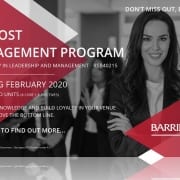HOW TO LEVERAGE YOUR LOCAL COMMUNITY
There’s no denying the power of social media for helping your business build connections online, but when it comes to connecting and engaging with your local community, face-to-face is where it’s at, writes Stephen J. Hunt, author and founder of Hunt Hospitality.
It’s no secret that COVID hit the hospitality sector particularly hard. Pubs like ours (we have seven in our portfolio) shut for months on end, density limits restricted how many people could come in, and people stopped going out even when they were ‘allowed to’. It’s been a tough couple of years for everyone in the sector.
But despite all that, we’ve had one of our best years on record. How did that happen? I put it down to one thing: we put our community at the front and centre of everything we did.
We thought about how we could best serve them during this difficult time, and as it turns out, they rewarded us with their loyalty and patronage, during and after COVID.
Real life connections are a powerful tool
The world’s obsession with social media has obscured how important it is to connect in real life with the people in your immediate vicinity.
Your local community is a rich, untapped vein of opportunity, yet is often overlooked as a cost effective (and often free) source of marketing.
Here’s three tips on how you can leverage your community to build your customer base, develop loyalty and protect yourself in a downturn, particularly for the hospitality sector.
1. Do your research
You can’t service your community unless you know who’s in your community. It’s easy to find out.
As a starting point, jump onto Google Maps and draw a circle around your region with your business in the centre. Then analyse all the businesses within that 3km radius. Who’s there? Who can you help? How can you serve them? What collaborations can you create with them?
Do the same with the people who reside within that area. Go to the Australian Bureau of Statistics website or your local council website and review the demographics of the residential area. Are they young families? Singles? Highly paid professionals? Senior citizens? Middle-aged mums?
Whoever they are, brainstorm what your business has in common with them, work out what you could offer them, and create a win-win for you both.
2. Give back
During COVID, our venues often put out Facebook posts promoting half priced take-away meals as we knew that our community was doing it tough in lockdown (both psychologically and financially), so we wanted to do something to help them. Within minutes of the post going up, we had 100 orders.
When it came time to re-open, people flocked back in and the first thing they said was, ‘Thank you for staying open and for providing a sense of stability. You helped us get through a difficult time”.
Have a think about what you can offer your community that will help them feel more connected. It doesn’t need to be a grandiose idea. Even the smallest of gestures can pay big dividends.
3. Take action
If you play your cards right and don’t mind doing a little bit of ‘guerrilla’ marketing, you can get substantial returns for a small investment.
For example, when we renovated The Kent Hotel in Hamilton, NSW, we did our due diligence (as always) and discovered that a major bank was building their offices around the corner, that the nearby sports stadium was home to over a dozen sporting codes, and that a new housing development targeting young families was going up around the corner.
Once we knew that, we used that information to put ourselves at the heart of the community. We did simple things that we knew they’d like and appreciate.
For example, we:
• Gave them all a loyalty card so they could get a free coffee when they bought their first lunch from us.
• Sponsored the local sporting club and invited them to have their after-game celebrations and award nights at our pub so that they had a communal place to celebrate (or commiserate).
• Employed the local footy and netball players as wait staff at our pubs.
• Joined the local Chamber of Commerce and got to know the members, contributed to the workings of the clubs and offered valuable support.
• Donated food and drinks to Rotary groups when they ran a sausage sizzle at Bunnings or hosted the local art show.
It’s important to note here that we don’t just focus on the community to get a business result or to source positive PR. Being community minded is a mindset and a corporate value that drives our every action.
A pub or club is the centre of the town, the village and the community, and the hub around which all things circulate. When we focus on their needs and think proactively about how we can help them, they do the same for us, and everyone wins.













